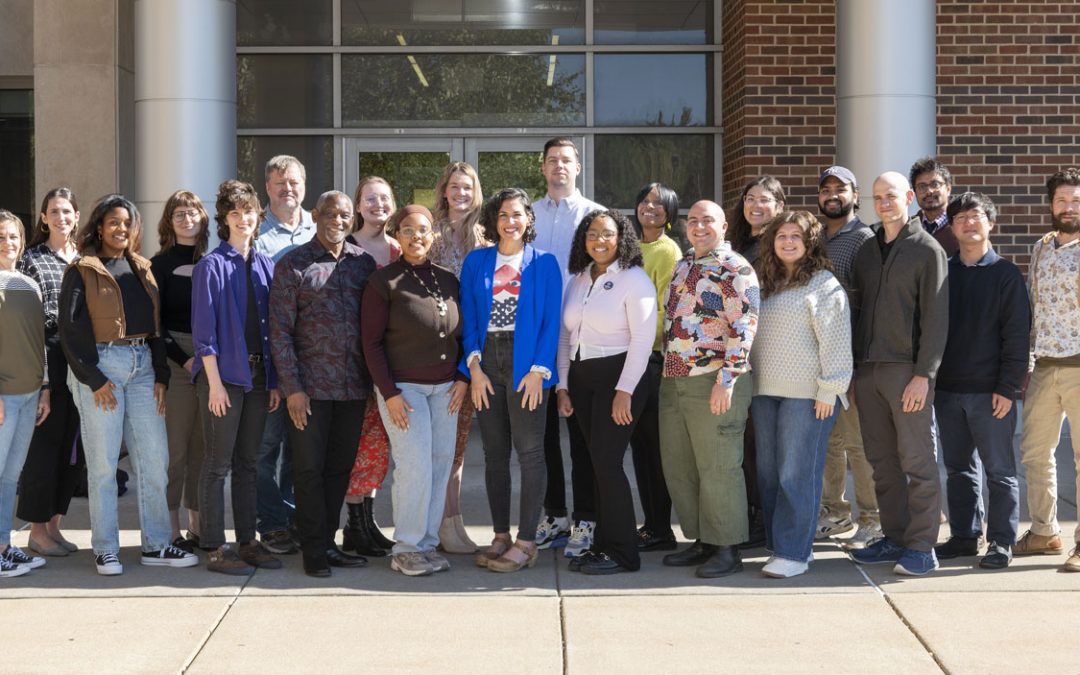
Lauren Obermark, associate professor of rhetoric at UMSL, released her first book, “Engaging Museums: Rhetorical Education and Social Justice,” this month. The book examines how museums address discomforting subjects that challenge visitors to confront traumatic events and work toward a better future. Additionally, Obermark outlines how they can be used as a model to reenvision rhetorical education. (Photo by August Jennewein)
As a graduate student, Lauren Obermark visited the National World War I Museum and Memorial in Kansas City as part of a class exercise.
At first, she wasn’t sure how the museum would inform her language and literature master’s. However, as the visit unfolded, she was impressed with how the exhibits engaged visitors in discussions about the difficult subject matter.
“When I went to the museum, I think seeing how they presented the information and asked people to engage with this historically violent event and consider implications for the present day, it felt really inspiring to me,” said Obermark, associate professor of rhetoric at the University of Missouri–St. Louis.
That experience was the inspiration for Obermark’s first book, “Engaging Museums: Rhetorical Education and Social Justice.” The book examines how museums address discomforting subjects that challenge visitors to confront traumatic events and work toward a better future. Additionally, Obermark outlines how they can be used as a model to re-envision rhetorical education.
She said it’s exciting but somewhat surreal to finally release something that’s been in the works for 10 years.
“In some ways, it’s surprising that other people are able to read it,” she said. “I’m so grateful that it found a good home with a publisher that is working hard to promote it and share it with people.”
Published in April by Southern Illinois University Press, the book presents case studies from three museums: the National Underground Railroad Freedom Center, the National World War I Museum and Memorial and the Oklahoma City National Memorial & Museum.
The featured museums tackle what Obermark characterized as “almost impossible” to discuss subjects: slavery, war and domestic terrorism. Yet, each institution has found ways to encourage visitors to think more deeply about these issues, including discussion prompts, guided audio tours and replica physical spaces where visitors are asked to dwell and engage in reflective dialogue.
“It is a book about these museums in some way, trying to honor the work that the museums do in their communities,” Obermark said. “In a bigger way, it’s a book about how all of us could work through our own discomfort to address these topics that we don’t want to talk about – usually topics connected to social justice.”
They’re familiar topics to Obermark, whose research interests center on social justice, disability justice, disability rights and avenues to publicly engage with those issues. With the museums, she saw an opportunity to translate their work to the classroom as a rhetoric and writing teacher.
“One of the big lessons that I see from museums that I think affects every class I teach is that they refuse to avoid the hard topics,” she said. “They can’t because it’s part of history, and evidence-based historical storytelling has to address hard topics. It has to show you what happened in the trenches during World War I. It has to bring that into the museum or else the museum is not doing justice to history or to the contemporary visitors.”
She added that difficult conversations are necessary if people want to participate in the slow and steady work of social change. They’re also crucial for an informed citizenry and participatory democracy.
The opportunity for exploration was another aspect of museums Obermark appreciated. She noted that learning, as well as conversation, is not always a linear, step-by-step process.
Obermark concludes “Engaging Museums” with a call to leverage collective memory as a pedagogical tool in the classroom and public institutions. This process, which Obermark emphasizes must be ongoing will often be messy, feel uncomfortable and require mistakes and trying again. This is true in both museums and university classrooms.
“It feels to me like the most important aspect of this book, in the present moment, is to think about how we can use memory,” Obermark said, “how we ethically remember and educate people about difficult things like enslavement and terrorism, how we dwell in that history and also connect it to present, catalyzing memory for social change.”
Those interested can learn more about and purchase “Engaging Museums: Rhetorical Education and Social Justice” at http://www.siupress.com/books/978-0-8093-3851-1














